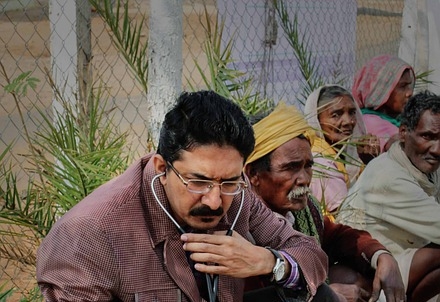Every child in India may enroll in Class I, but how many will go through primary school, secondary school, and on to college or university education? A recent Ministry of Human Resources Development publication provides the answer - out of every 100 students, only 69 will enroll in Class V; 36 in Class X; 19 in Class XII. Of the 19, only 13 will pass the school-leaving exams. Thus, while the entire education and employment system is geared toward the 13 percent of students who complete their schooling, the overwhelming majority - 87 percent - must make their own efforts to develop their skills and make themselves employable.
How could they do this? T Muralidharan, Chairman of the TMI group of companies, thinks the whole thing is set up backwards. Generally, everyone first studies in anticipation of a job and then searches for a job. What would be better, he says, is if employers first pick up candidates for jobs based on aptitude, direct them to educational courses to develop their particular skills, and upon completion of the courses at the candidate's cost, employ every one of them. This novel approach to employability of rural youth is now over a year old, and has helped some 4000 people get jobs. He says the freshers do not mind spending their own money, even borrowed money, on education if jobs are assured.
TMI First, a company floated by Muralidharan and others, is focusing on rural and semi-urban youth around over 400 small towns, who can be trained to get jobs in various sectors including retail, financial services, manufacturing, IT and BPO. Muralidharan says "the keys to creating and sustaining millions of jobs in the 10/12 class drop out segment are to ensure that people work on the right jobs - ones that suit their capability and personality - and to make them employable at their own cost, while the employer owns the training for employability".
TMI first has conceived and launched a special employability coaching course called STEP (Smartly Tailored Employability Programme) to focus on the first task, and for the second task, it has developed the Jointly Owned Job Oriented Education (JOJOE) model programme that appears quite promising. Development functionaries working on various rural related issues will be interested in understanding this concept and exploring how it can be adapted suitably in their work or otherwise. This could have great potential for schemes for millions of semi-literate rural youth.
How hard is it to convince companies to engage rural and semi-urban youth for various jobs in cities? Does one have to appeal to their social responsibility to create such jobs? No, says Muralidharan, an alumnus of the Indian Institute of Management, Ahmedabad and Indian Institute of Technology, Chennai. "The corporates are not taking a philanthropic view, but are considering it a pure business outlook". With city-bred young talent now able to pick and choose jobs, there is a high attrition rate in many industries, and employees have unrealistic job expectations. Rather that eternally develop schemes to retain this talent, companies may be better off hiring rural employees instead.
However, rural folks too have some expectations and difficulties - adjusting to new places, feeling lonely or homesick, etc. So TMI First developed the idea of 'work+stay+eat' instead of just 'work'. Groups of people are also hired to work together, so that their opportunity for some social life in the city is greater. When jobs relocate to smaller towns or rural areas, some of these employees from rural areas would have opportunities to move closer home.
TMI First also recognises that employers often need help in assessing and selecting rural and semi-urban youth. Usually, employers have a clear vision of what skills are required from prospective employees only in some of the jobs - those which have been around for some time. Besides, with increasingly large volume of hires, the assessment time per employee is dropping, and it is harder, as a result, to assess potential employees reliably. And finally, the assessment techniques used for hiring city youth do not work while assessing this target group.

•
Local languages are key to jobs
•
Catalysing rural jobs
•
A rural B-school for women
There are three models for meeting the costs of these courses - either the employers can themselves pay, or the student pays, or a third party - often the government - pays. Muralidharan believes that a sustainable model would be for the student to pay a portion of the costs, along with some subsidy from the government or employers. Microfinance institutions are also willing to provide loans, provided the employer and the funding institutions are willing to sign a long term agreement. The role of microfinance institutions may be especially important, because educational loans from banks are difficult to access, due to the lack of explicit guidelines for funding short-term job oriented courses, either from the Government or the Indian Banks Association.
Also corporates can be encouraged to provide assistance, as grants or loans, as part of their Corporate Social Responsibility; this can be done either directly or through microfinance institutions. Yet another option could be central or state government assistance from the funding earmarked for various education and livelihood enhancement schemes. TMI First is already working with some of the state governments for promoting such skill development programmes.
At TMI First, the focus is on those who have dropped out late in their school years - between Class X and XII. Across the country, approximately 6.7 million students each drop out at this stage, and will need training such as the one available through JOJOE. On the supply side, TMI First is working to create 100,000 JOJOE students every year by 2010. On demand side too, TMI First is working on 'right grading' (and not down-grading) the qualification specifications of entry level jobs. There is very little awareness that the quality of high school has risen dramatically in recent years, whereas college education has been more stagnant. Hence employers may need to revisit their job specifications and focus on college drop-outs or high-school drop-outs more or less equally.























